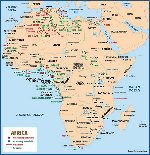Africa: Tunisia
August 2000 Vol. 221 No. 8 International Outlook AFRICA Tunisia President Zine El Abidine Ben Ali was re-elected in October 1999, along with his
AFRICATunisiaPresident Zine El Abidine Ben Ali was re-elected in October 1999, along with his party. The country’s GDP should have a repeat year of 6.2% growth. Tunisia plans to speed up privatization of portions of its public sector. It now has free-trade agreements, in various stages of implementation with Morocco, the EU and, as of June 2000, Libya. Exploration. A new hydrocarbons code became effective in February 2000 and applies to all future E&P contracts. The law creates new incentives for oil firms, since the country needs to develop oil exports. As a sign of future exploration, 3,950 mi of 2-D and 82 sq mi of 3-D seismic will be acquired in 2000.
In June of this year, Nuevo Energy acquired a 100% interest in the Alyane permit in the Gulf of Gabès. The company will acquire 3-D seismic data in early 2001 and drill an exploratory well in late 2001 or soon thereafter. Nuevo boosted its interest to 37% in Tunisia’s Fejaj permit; the firm plans to test a sub-salt prospect late this year by deepening the Chott Fejaj 3 well drilled in 1998. Eurogas plans to drill an exploration well, by year-end, in a huge structure in central Tunisia’a Bazma permit. Anadarko expects to drill an exploration well in the onshore Anaguid permit by December 2001. Development. British Gas plans to invest $450 million over a nine-year period developing the Hasdrubal gas / condensate discovery, extending the Miskar gas field and undertaking further exploration. Hasdrubal, with proven reserves of 260 Bcfg and 25 million bbl of condensate, is 15 mi south of Miskar field in the Amilcar permit, Gulf of Gabès. An appraisal well will be drilled in 2002 to assess reserves potential adjoining Hasdrubal before finalizing a development plan. Miskar field, which supplies two-thirds of Tunisia’s gas demand, will be expanded over a five-year period beginning this year. BG has already invested over $600 million in the initial development of Miskar. Further field development could add another 65 MMcfgd to the current 165 MMcfgd. These developments should make Tunisia self-sufficient in gas – or nearly so, depending on demand increases and exploration success. The government recently approved Centurion Energy’s Al Manzah field plan for development. The field is located in the North Tunisian Grombalia permit. The plan includes placing the AMZ 1 discovery well back onstream – following installation of production facilities and the drilling of two horizontal development wells scheduled for late summer. Initial production from AMZ 1 was 850 bopd with a high GOR and no water. The operator is planning to run coiled tubing in the wellbore to increase oil production, which averaged 2,200 bopd during testing. Production. Contrary to various published reports,
crude-plus-condensate production has been increasing in recent years. According to Tunisia’s Directorate
General for Energy, 83,041 bpd were produced, up 1.3% from 1998. Gas production averaged 197.8 MMcfd last
year, up 1.8% from 1998.
|



